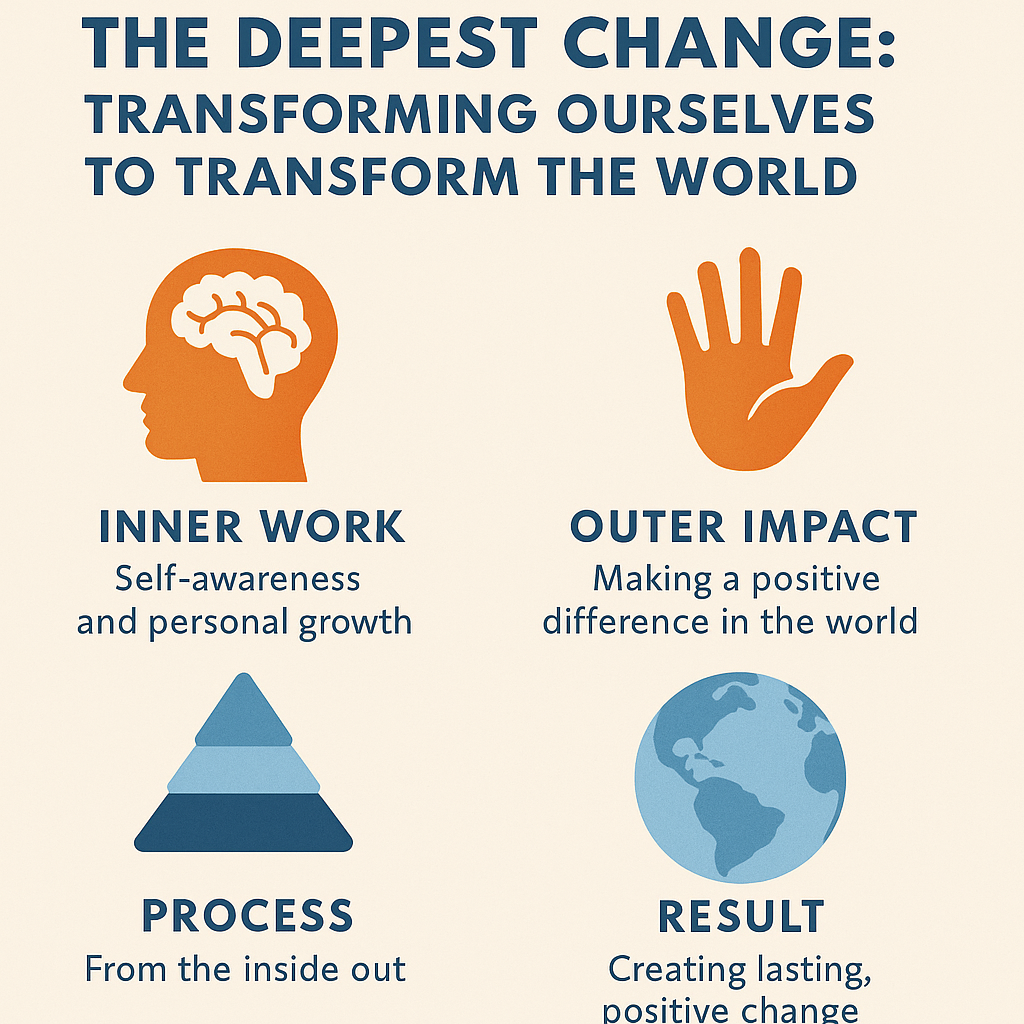Throughout history, the wisest thinkers, philosophers, and spiritual leaders have repeated one profound truth: true change begins within ourselves. Although many embark on their life’s journey seeking to “fix” the world around them, they often discover—sometimes painfully—that external efforts without internal transformation are fleeting, superficial, and ultimately ineffective.
The quotes you shared—by Rumi, Tolstoy, Marcus Aurelius, Friedrich Nietzsche, Viktor Frankl, and the Unknown Monk—each in their own way build a profound roadmap about personal transformation as the foundation for lasting societal transformation.
Let’s explore this message step-by-step:
The Illusion of External Change
“Yesterday I was clever, so I wanted to change the world. Today I am wise, so I am changing myself.” — Rumi
When we are young, idealistic, and full of ambition, it is natural to believe that the problems we see in the world are “out there”—caused by other people, corrupt systems, bad leaders. We believe that by reforming the outer structures, we can bring about peace, justice, and goodness.
However, Rumi’s wisdom reminds us that cleverness without wisdom seeks to fix the outside without understanding the deep work of the inside.
Similarly, Tolstoy echoes this when he says:
“If you want to change the world, start with yourself.”
Without a change of heart, character, and perception, no structural change we impose will ever last. Why? Because the roots of chaos lie first in human hearts—not institutions.
The Real Battlefield: The Mind and Perception
“Seek not to change the world, but change the way you perceive it.” — Marcus Aurelius
“Do not look for a change of circumstances, look for a change of mind.” — Friedrich Nietzsche
The Stoic philosophers, including Marcus Aurelius, understood that external circumstances are never fully within our control, but our perceptions and reactions are. Nietzsche follows this Stoic insight: Changing your outer environment while your mind stays the same achieves little.
It is not what happens that determines the quality of our lives, but how we choose to see and respond to what happens.
Perception is creative: it either creates gratitude or bitterness, hope or despair, freedom or bondage. Thus, the ultimate act of power is not changing the event, but transforming the meaning we give to it.
Suffering, Acceptance, and Growth
“When we are no longer able to change a situation, we are challenged to change ourselves.” — Viktor Frankl
Frankl, a Holocaust survivor, saw firsthand that circumstances can strip a person of every material freedom—except one: the freedom to choose one’s attitude.
Even when facing suffering beyond comprehension, human beings retain the ability to choose dignity, courage, faith, and inner meaning.
Rather than fighting against what cannot be changed, Frankl shows us that growth happens when we embrace the challenge to evolve from within. Suffering becomes transformational rather than destructive.
The Power to Change Lies Within, Not Without
“The power to change your life is within you, not in external circumstances.” — Friedrich Nietzsche
This realization is perhaps the most revolutionary: the true locus of control is internal.
External changes—new laws, new leaders, new organizations—only matter when there is an internal revolution first: the revolution of heart, mind, character, and spirit.
This echoes the wisdom of the ancient unknown monk from 1100 A.D.:
“When I was young, I wanted to change the world… I realized in old age that the only thing I could truly change was myself… and by changing myself, I could have changed my family, my town, my nation—and thus the world.”
This parable beautifully illustrates the ripple effect of personal transformation:
- Change yourself → influence your family
- A changed family → influences the community
- A changed community → influences the nation
- A changed nation → influences the world
The seed of global change is always personal.
The Application to Our Modern Life
Today, society is still largely obsessed with external solutions:
- Changing politics without changing the heart.
- Changing policies without changing minds.
- Seeking new institutions without cultivating character.
But without moral, spiritual, and emotional renewal on the personal level, nothing changes at its root.
If we truly seek:
- Justice → we must first become just ourselves.
- Peace → we must first become peaceful ourselves.
- Wisdom → we must cultivate wisdom internally.
- Compassion → we must first live compassion daily.
The “matrix” of our current culture (as Covey, Gileadi, and others have taught) trains us to chase external solutions: new toys, new technologies, new ideologies, but no box or tool can fix a broken soul.
True transformation is always inside-out, not outside-in.
Conclusion: The Revolution of the Self
Changing the world starts with:
- Changing how we think
- Changing how we perceive
- Changing how we love
- Changing how we act
In the words of Rumi, Tolstoy, Marcus Aurelius, Nietzsche, Frankl, and the humble unknown monk: Personal transformation is the foundation of societal transformation.
The ladder to a better world does not lean against the systems of power; it is built one step at a time within the human heart.
Would you also like a Visual Infographic summarizing all of this, maybe something like:
- Centerpiece quote: “Change Yourself, Change the World.”
- Arrows radiating to Rumi, Tolstoy, Marcus Aurelius, Nietzsche, Frankl, and the Monk’s wisdom?






